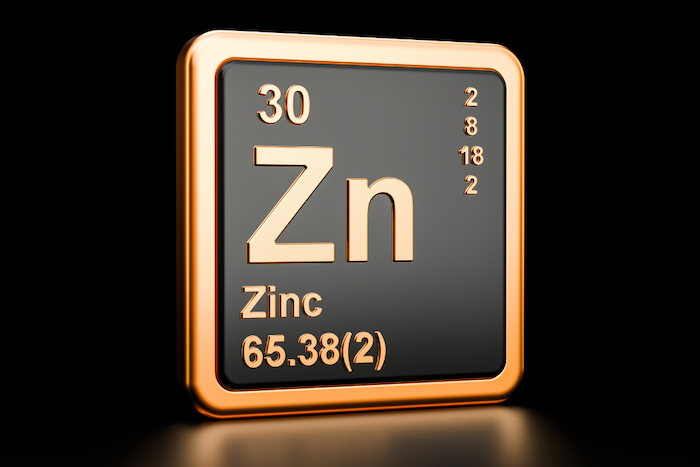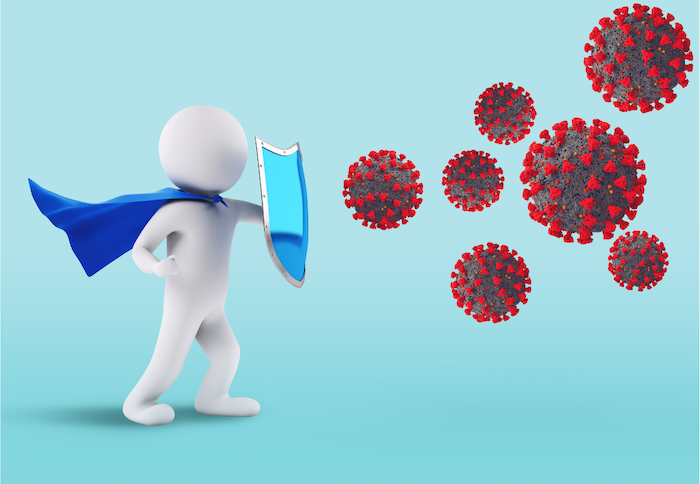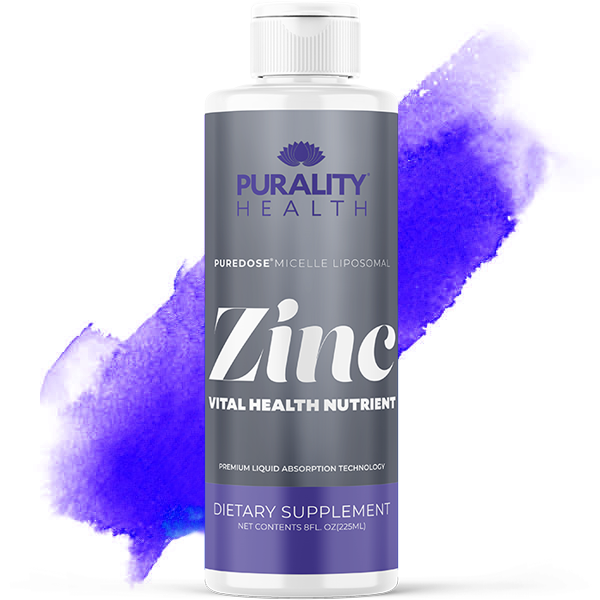When you think of “immune-boosting” nutrients, your mind probably jumps straight to vitamin C. But there’s another mineral quietly powering your body’s defenses every single day — zinc.
 Zinc is essential for more than 300 enzymatic reactions in the body — many of which control your immune system, cell repair, and even how quickly you recover from illness.
Zinc is essential for more than 300 enzymatic reactions in the body — many of which control your immune system, cell repair, and even how quickly you recover from illness.
And yet, most people don’t get nearly enough.
Modern diets, stress, and even soil depletion have led to widespread mild zinc deficiency. This means your immune system may be running on half-power without you realizing it.
If you’ve noticed you catch colds easily, take a while to bounce back after getting sick, or your skin takes longer to heal, low zinc could be part of the reason.
So today, let’s look at 7 powerful ways zinc supports your immune system and why making sure you’re getting enough of it could be one of the simplest ways to stay healthy all year long.
1. Zinc Helps Your Immune Cells Multiply and Mature
Every day, your immune system creates billions of new cells — white blood cells, T-cells, and natural killer (NK) cells — all designed to identify and destroy harmful invaders before they spread.
And to make those defenders, your body needs zinc.
Zinc plays a direct role in how immune cells develop, activate, and communicate with each other. Without it, your immune system struggles to produce enough of these vital defenders, and the ones that do form are less effective at fighting infections.
In one clinical study, researchers found that even mild zinc deficiency led to a noticeable decrease in T-cell function and overall immune responsiveness. [1]
That means your body can’t mount a strong defense when viruses or bacteria show up, leaving you more vulnerable to every passing bug.
The takeaway: zinc doesn’t just “support” immunity… it literally builds it.
2. Zinc Supports Faster Recovery from Illness
When your immune system detects an invader — like a cold or flu virus — it quickly goes into defense mode. But here’s the problem: sometimes that defense can overshoot, leading to excessive inflammation that actually slows recovery.
That’s where zinc steps in.
Zinc helps your body regulate cytokines — the chemical messengers that control your immune response. By keeping cytokine activity balanced, zinc helps your immune system respond quickly without going into overdrive.
It’s also been shown to directly inhibit the replication of certain viruses, which means your body can clear infections faster.
In fact, multiple clinical studies have found that supplementing with zinc — especially at the first signs of a cold — can shorten the duration and reduce the severity of symptoms. [2]
In other words: zinc helps your body work smarter, not harder.
3. Zinc Strengthens Your Mucosal Barrier (Your Body’s First Line of Defense)
 Before viruses or bacteria ever reach your bloodstream, they have to get past your mucosal barrier. This is the protective lining inside your nose, mouth, throat, lungs, and digestive tract.
Before viruses or bacteria ever reach your bloodstream, they have to get past your mucosal barrier. This is the protective lining inside your nose, mouth, throat, lungs, and digestive tract.
Think of this barrier as your body’s immune “shield.” It traps and neutralizes harmful particles before they can invade deeper tissues.
Zinc helps keep that shield strong.
It supports the structure and repair of epithelial cells — the building blocks of those protective tissues — and helps your body produce mucus with the right consistency to trap pathogens effectively.
In studies, people with low zinc levels were shown to have weaker mucosal membranes, making them more vulnerable to respiratory and gastrointestinal infections. [3]
So while zinc helps your immune system fight off invaders from the inside, it’s also reinforcing your outer defenses, giving your body a better chance of stopping illness before it starts.
4. Zinc Helps Reduce Inflammation
A strong immune system isn’t just about fighting germs — it’s also about controlling inflammation.
When inflammation lingers too long, it can actually weaken your immune defenses, damage healthy tissue, and make your body more vulnerable to illness.
Zinc acts as a natural anti-inflammatory and antioxidant, helping your body calm that excessive immune activity.
It does this by reducing the production of inflammatory molecules like cytokines and helping neutralize free radicals — unstable compounds that trigger oxidative stress and cellular damage.
In controlled studies, people with higher zinc intake were found to have lower levels of inflammatory markers (like CRP and TNF-α), showing that zinc helps your body maintain balance — fighting infection without tipping into harmful inflammation. [4]
So, in addition to keeping your immune cells strong, zinc helps them stay smart — responding just enough to protect you, but not so much that they harm healthy tissue in the process.
5. Zinc Supports Wound Healing
Your immune system isn’t just for fighting off viruses — it’s also responsible for repairing tissue after injury.
And here again, zinc plays a crucial role.
Zinc supports the production of collagen and connective tissue, both of which are essential for closing wounds and rebuilding healthy skin. It also assists in cell division and protein synthesis, two processes that help your body replace damaged cells quickly and efficiently.
In clinical research, people with low zinc levels were found to experience delayed wound healing and slower recovery after surgery or injury, while zinc supplementation helped speed up repair. [5]
That’s because zinc is part of nearly every stage of the healing process, from reducing inflammation to rebuilding new tissue.
So whether it’s a small scrape, a skin irritation, or just the wear-and-tear of daily life, zinc helps your body repair and renew itself faster.
6. Zinc Keeps the Gut Microbiome in Balance
 Here’s something many people don’t realize: roughly 70% of your immune system lives in your gut.
Here’s something many people don’t realize: roughly 70% of your immune system lives in your gut.
Inside your digestive tract are trillions of bacteria — some good, some not so good — all competing for space. When this delicate balance tips in favor of harmful microbes, your immune function takes a hit.
Zinc helps keep things in check.
It plays a key role in maintaining the integrity of your intestinal lining, preventing unwanted particles from leaking into the bloodstream (a condition sometimes called “leaky gut”). It also supports the growth of beneficial bacteria — the kind that help regulate inflammation and strengthen immune responses.
In studies, even a mild zinc deficiency has been shown to disrupt gut flora balance and increase intestinal inflammation, which can weaken immunity over time. [6]
By supporting gut health, zinc supports everything connected to it, from digestion to nutrient absorption to the resilience of your immune system itself.
Because when your gut is balanced, your defenses are too.
7. Zinc Deficiency Increases Susceptibility to Illness
Even a small drop in zinc levels can have a surprisingly big impact on your immune health.
That’s because zinc isn’t stored in large amounts inside the body. You need a steady daily supply to keep your immune system running at full capacity.
When zinc levels fall, the production and function of your immune cells decline. Research has shown that people who are even mildly deficient in zinc are more likely to:
- Catch colds and respiratory infections more often
- Take longer to recover from illness
- Experience greater fatigue and immune weakness during stress
In one observational study, individuals with low zinc intake had significantly higher rates of infection and inflammation markers — showing just how tightly linked zinc and immunity really are. [7]
The takeaway? Keeping your zinc levels balanced isn’t just about avoiding deficiency — it’s about maintaining your immune system’s full defensive power every single day.
Why Micelle Liposomal Zinc Matters
By now, it’s clear that zinc is one of the hardest-working nutrients in your immune system. But here’s the catch — zinc isn’t always easy to absorb.
 Traditional zinc capsules and tablets can lose much of their potency during digestion, meaning your body might only use a fraction of what’s on the label. And if you’ve ever felt queasy after taking a zinc pill on an empty stomach, you know that conventional forms can also be harsh on the gut.
Traditional zinc capsules and tablets can lose much of their potency during digestion, meaning your body might only use a fraction of what’s on the label. And if you’ve ever felt queasy after taking a zinc pill on an empty stomach, you know that conventional forms can also be harsh on the gut.
That’s why delivery matters just as much as dosage.
Purality Health’s Micelle Liposomal Zinc uses a unique absorption system that protects zinc molecules as they travel through your digestive tract, helping them reach your bloodstream faster and more efficiently.
Here’s how it works:
- Micelle encapsulation surrounds each zinc molecule in a fat-soluble shell for better stability.
- Liposomal delivery mimics your body’s own cell membranes, allowing zinc to slip through barriers that would normally block it.
The result? Up to 5x better absorption than standard zinc capsules.
That means more zinc where it counts — in your immune cells, tissues, and enzymes — and less wasted along the way.
Because when it comes to supporting your immune system, it’s not just what you take… it’s what your body can use.
The Bottom Line
Your immune system is only as strong as the nutrients you give it.
And when it comes to staying healthy through every season, zinc is one of the most important — yet most overlooked — minerals your body depends on.
From helping immune cells multiply and heal, to balancing inflammation and strengthening your body’s first line of defense, zinc is truly one of your immune system’s unsung heroes.
But because your body doesn’t store much zinc, it needs a steady daily supply — one your immune system can actually absorb and use.
That’s why we created Purality Health’s Micelle Liposomal Zinc — a highly absorbable liquid formula designed to deliver zinc exactly where your body needs it most.
Just one daily dose supports:
✅ Stronger, faster immune response
✅ Healthier skin and tissue repair
✅ Improved recovery and resilience
✅ Year-round defense you can feel
All in a smooth, easy-to-take liquid that your body can absorb up to 5x better than standard zinc pills.
✨ Tap here to give your immune system the support it deserves with the zinc your body can truly use >>
Because your best defense starts with better absorption. 💪
